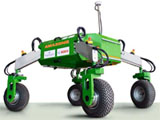Agricultural and Biological Systems Engineering, Department of

Department of Agricultural and Biological Systems Engineering: Faculty Publications
Document Type
Article
Date of this Version
2018
Citation
Vol. 61(5): 1547-1557
Abstract
Most modern off-road machinery use embedded electronic controllers connected to a controller area network (CAN) to broadcast machine information for on-board processes and diagnostics. Commercially available tools can record CAN data for a variety of research and commercial uses. For agricultural tractors, there is an opportunity to create advanced test procedures that are more representative of field operations and that could supplement existing machine performance tests, such as the OECD Code 2 Standard Code for the Official Testing of Agricultural and Forestry Tractor Performance. CAN parameters provide an efficient way to collect tractor performance data during field operations. However, the accuracy of CAN messages is not known, and little information was found in the literature regarding the accuracy of CAN messages or validation of reported signals. The objective of this study was to investigate the accuracy of net engine torque as calculated from several relevant CAN channels by comparing it to torque measured with a calibrated laboratory dynamometer. Results of this study indicate statistically significant differences between calculated and measured net engine torque, although there was a strong correlation. Recommendations for future work include replicating this study on more and different engines that report actual engine percent torque - fractional (SPN 4154) and estimated engine parasitic losses - percent torque (SPN 2978). This would provide higher-resolution torque estimates that may help explain the torque differences observed in this study.
Included in
Bioresource and Agricultural Engineering Commons, Environmental Engineering Commons, Other Civil and Environmental Engineering Commons


Comments
© 2018 American Society of Agricultural and Biological Engineers
https://doi.org/10.13031/trans.12754